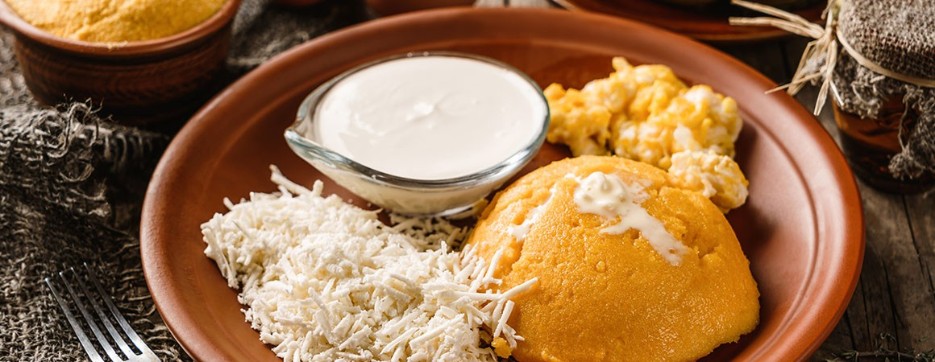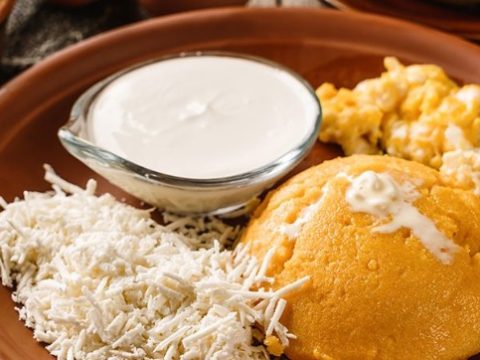How to Make Mămăligă: Tips and Secrets for a Perfect Recipe
“Let’s make some mămăligă” has echoed in Romanian kitchens for as long as corn has been grown on our lands. That beautiful expression whets the appetite at the thought of freshly cooked mămăligă, served alongside sarmale, ciulama, tochitură, or a generous dollop of sour cream and Romanian cheese.
If you share our enthusiasm and want to master the creamiest, most tender mămăligă, read on to learn the key steps to preparing it correctly and easily.
What Is Mămăligă and Why Is It So Beloved in Traditional Romanian Cuisine?
We’re not exaggerating when we say mămăligă is a symbol of Romanian identity, especially in rural areas. Through economic hardships—from feudal systems to communism—cornmeal remained a staple because it was affordable, quick to cook, and very filling. In poorer households, it often replaced bread, which required more labor and pricier wheat.
But beyond necessity, mămăligă is simply delicious. How can a mixture of cornmeal, water, and salt taste so good? It can be a side dish, a main course, or even a dessert. Its mild flavor pairs wonderfully with a wide range of ingredients, allowing both traditional and modern adaptations.
Mămăligă is known as a traditional Romanian dish, but remember that polenta in Italy and similar dishes in Russia, the Balkans, and the Caucasus share the same roots.
Ingredients for Traditional Mămăligă
Water, cornmeal, and salt are the three essential ingredients. Don’t confuse cornmeal with corn flour—both come from corn kernels, but corn flour is ground very finely, like wheat flour.
For extra richness, some replace part of the water with milk—imagine that heavenly taste! Butter is also crucial for a creamy texture and rich flavor. And don’t skimp on salt: it unlocks the full flavor potential of starchy foods like polenta, pasta, and potatoes.
Essential Steps for Perfect Mămăligă
1. Measure Accurately
Water-to-cornmeal ratio: For a softer mămăligă (ideal with cheese and sour cream), use 4:1 water to cornmeal (e.g., 4 cups water to 1 cup cornmeal). For a firmer loaf that can be sliced—great for bruschetta with cheese and wild garlic—use a 3:1 ratio.
2. Stir Constantly
Sprinkle the cornmeal in a steady “rain,” slowly, to avoid lumps. Constant stirring also prevents sticking and scorching.
3. Cooking Time
Depending on the cornmeal’s coarseness, cook 15–25 minutes over low heat. Instant polenta takes just 3–5 minutes. It’s done when it pulls away from the pot’s sides or you feel no grits on your tongue—smooth and creamy.
4. Gentle Simmer
After adding the cornmeal to boiling water, reduce to the lowest heat. Simmer gently, stirring constantly.
The Best Pot for Mămăligă
To prevent sticking, choose enameled cast iron (Staub, Lava) or heavy-bottomed aluminum pots (AMT Gastroguss). They heat evenly. If using nonstick, avoid metal whisks.
Stainless steel works too, but ensure it has a thick, multilayered base for proper heat distribution.
How to Avoid Lumps
Use a whisk when first sprinkling in the cornmeal. Once the mixture becomes too thick, switch to a wooden spoon. The more you stir, the smoother your mămăligă.
Simple Traditional Mămăligă Recipe
Ingredients:
- 250 g cornmeal
- 1 L water
- 1 tsp salt
- Optional: 1 Tbsp butter
Steps:
- Boil water in a large pot. Add salt and stir to dissolve.
- When water boils, lower the heat and gradually sprinkle in the cornmeal, stirring constantly.
- Simmer on low for 20–25 minutes, stirring regularly to prevent sticking.
- Stir in butter for 1–2 minutes until melted and fully incorporated.
- Serve immediately alongside cheese, sour cream, or sauces.
What to Serve with Mămăligă
Mămăligă’s versatility shines with:
- Sarmale or stewed cabbage
- Prăjitură of Danube carp with garlic sauce
- Layered mămăligă with burduf cheese & smoked sausage (“Taci și înghite”)
- Sweet versions: mămăligă with strawberries & sour cream, alivanca (Moldovan cheesecake), cornmeal cake with cardamom & pistachios


